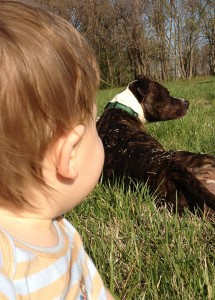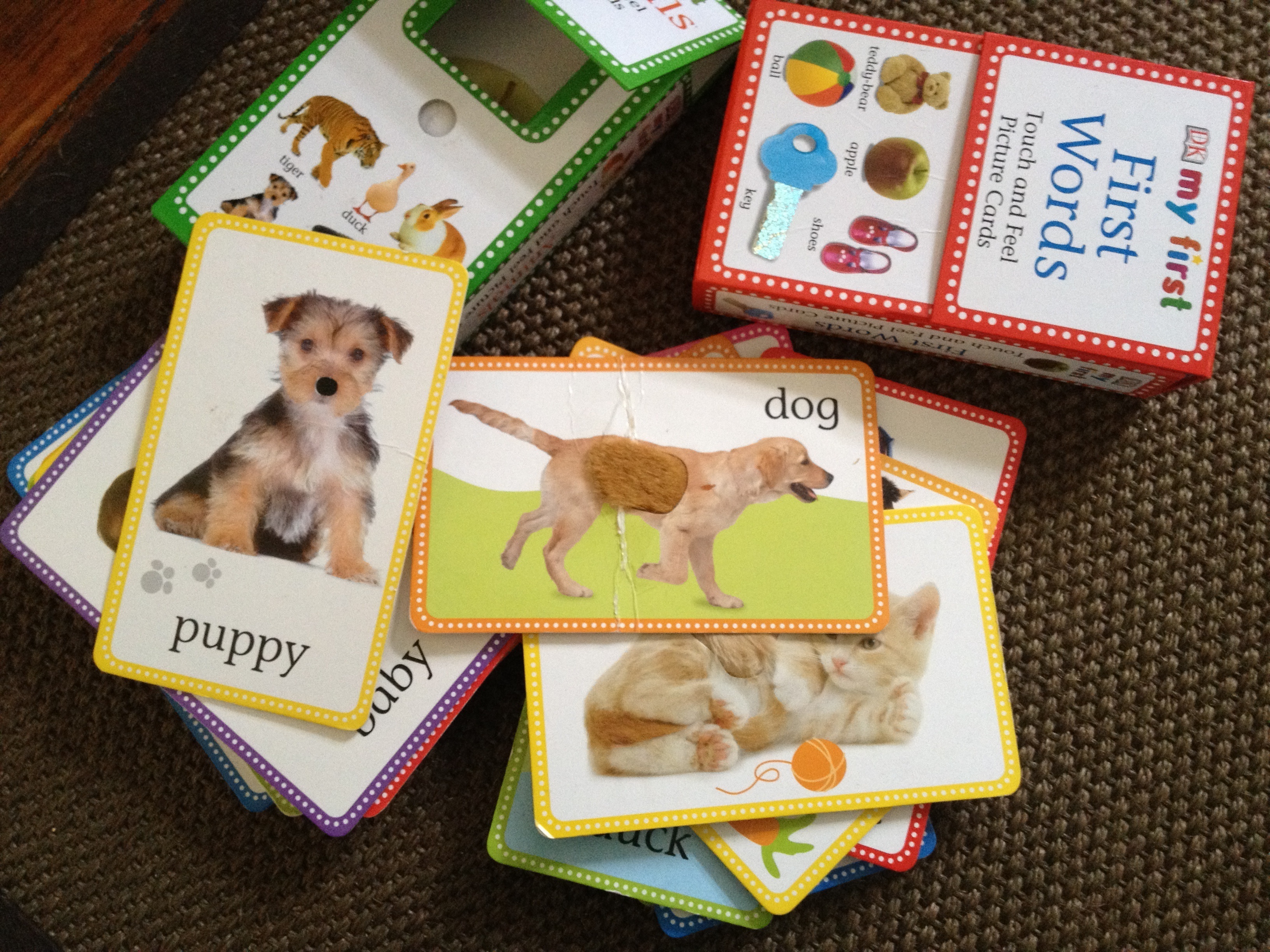Meeting toddler language milestones
My son’s first — and for a long time only — word was “dog.” But he usually forgets to pronounce the “g,” so it’s more like a loud, desperate “douh,” said with an eagerly pointing finger and exaggerated pursed lips.
In recent weeks he has added “duck” (for which does manage to pronounce the last consonant), and of course he says “dada” all the flipping time, and “mama” when he’s sad or tired.
But “douh” is his favorite. Everything with four legs is a “douh,” and he’ll point and look at me with such an eagerness as if he’s checking to see if he’s right that indeed that sheep or cow or cat or bear is a dog. Luckily there a lot of dogs in the world and in books, so more often then not, he’s right. We also have a dog at home, so there are endless opportunities to say his word and check for accuracy.
After what feels like six months of my kid saying “douh” (and us saying, “yes, you’re right, that is a doGuh”), I began to wonder if this would be his only word. Ever. Is my kid destined to say one single incorrectly pronounced word for the rest of his life?
For the answer, I turned to the Internet. I did get a little relief when I searched for the typical milestones of a 15-month-old. BabyCenter tells me that most toddlers this age can say “mama,” “dada” and three other words. We’re pretty close to that. I’m pretty sure he said “wawa” for water the other night. Let’s count that. Three.
They also tell me that at this age, they can follow simple commands like, “bring me your shoes,” which I am happy to report, my boy can do sometimes. He certainly understands some of the things we tell him — probably way more than we think.
My anxiety over his language development is fueled by a few things, besides my general tendency toward anxiety. As a writer and journalist, I think it’d be really swell that I have a kid who embraces the English language early and often. (But let it be noted that I do not want him to grow up to be a writer or journalist. How about engineer like his dad? Doctor like his grandfather? And unlike my own parents, I will strongly encourage these more lucrative and stable paths.)

My son has also battled with recurrent ear infections throughout most of his first year. We were this close to considering ear tubes and adenoid removal surgery, and visited a specialist about it. We were told to wait it out through the summer, when those things usually clear up, and he has indeed improved. He also passed a hearing test, but part of me worries all that ear stuffiness affects his language development. He just sounds like a tiny Darth Vader all the time. That’s my kid. People comment on it a lot: “Oh someone’s got a cold.” No, he doesn’t have a cold. That’s his thing. Stop staring.
Finally, I’m surrounded by genius babies, usually girls. One friend’s 12-month-old can basically recite the Constitution and has been walking for months.
How do you not compare a little bit? Of course I try not to care, and honestly most of the time I don’t worry about it. But isn’t that something in the back of all parents’ minds? Don’t they want to give their kid every advantage? Doesn’t it make your chest puff up a bit when you see your kid excel?
I’ve always tried to talk a lot to my son since he was born. Words, words, words. (Don’t get me wrong. I’m not a helicopter parent by any stretch. I don’t pester and hover. When we’re playing together and when we’re doing mundane tasks like getting dressed, changing diapers, getting in the car, I try to talk about it.) We read stories before bed. We have cards with pictures and words on them, and my son loves hearing the words and pointing at the objects.
I’ve also tried lately to be better about listening to him. I didn’t realize I wasn’t always listening until he said “wawa” at dinner and I didn’t even recognize he was asking for water until my husband pointed it out. I have to remember that his words won’t sound just like ours for a long time, and he needs to feel like he is being heard and encouraged to try. Even if I want to jump out of window after the 4,000th “douh.” (“Yes, that is a doGuh. DOG.”)
I have also been taking him to the Mother Goose on the Loose song and story time at the public library, which I love and he is really getting into lately. The woman who runs the story time once said not to worry if our babies wander around the room and play with toys rather than sit diligently in the circle for each song.
“It’s OK, let them be. They are still absorbing the language around them,” she told us.
I like that. They are tiny sponges soaking in the words all around them, not just what we are drilling into them with flashcards and pointing and repeating. All of the language they hear surrounding them every day filters subtly into their minds. I’ve tried to keep that in mind and just let my boy take in the language at his own pace
Encouraging language
I’ll leave you with some tips from my research. Here’s what I found for encouraging more toddler talk. They’re mostly no-brainers, but not always easy to be cognizant of in the day-to-day.
- Build on what your child says. So if he says “dog,” respond by saying, “Yes, that is a dog. What a nice dog. Let’s gently pet the dog.”
- Give your child options to build conversation, such as asking if he wants milk or water.
- Use what they call “parallel talk,” basically providing a narrative of what your kid is doing. “You’re eating your breakfast.”
- Talk a lot to the little one, using a varied vocabulary. Talkative parents have been shown to have kids with richer vocabularies. You hear that, son? I’m nothing if not a talker. I’m ready when you are.

Sara Michael is a first-time mom with Type A tendencies. She likes rules, makes lists, and follows plans. That all seemed to work out fine until she had a baby. Now she balances her need for order and answers with the desire to enjoy the unpredictable journey she is on with her 2-year-old son (and a second on the way). Her day job? She is a writer and editorial director at a health care media company where she manages content for an online publication. Her journalism background started in daily newspapers, covering health, science and government. Follow her on Twitter @sara_the_writer.

